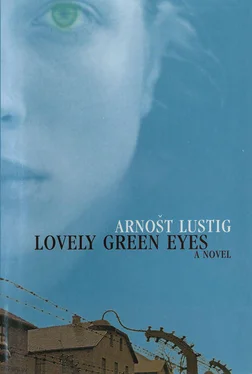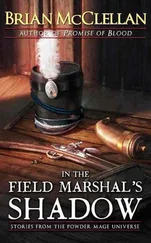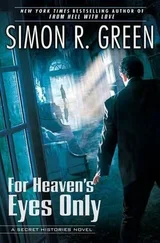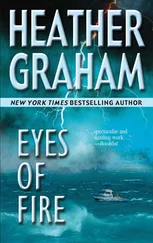“You should be glad I chose you. Your turnaround time here must be faster than our fuel convoys.”
“I am glad,” she lied. She avoided his eyes.
“I started on a poem entitled “All Rivers Die in the Sea,” he confided. “It could even be a song.”
“Yes,” she agreed.
“Death interests me. It is like a cat that won’t come to anyone it doesn’t like. Death is also like a dog, a faithful fighting companion. You’ve got to pay for this realization. In the past it was enough for me to swear allegiance to my commanding officers and to the anthem of the unit; ‘May death be our companion in our black column’s fight’ Have you ever heard the men of an Einsatzkommando sing? The words, the tune, the sound of hobnailed boots are like a north wind. Our war cry is lively and sad, foreboding and joyful. We are like tempered steel. That is what the east has done to us. I’m not bragging.”
“Yes,” she agreed softly.
“We were born for death, that great bubble. Every one of us may proudly proclaim, T am an oak and an ash’.”
He should read to her what Nietzsche had written. Wild beasts with unclouded conscience, monsters filled with jubilation.
“He probably said this about us even before we were born.”
She should learn that too. It heralded the revolution which meant blood. An eye for an eye. Yesterday a peasant had cut off the foot together with the boot of the dead Scharführer Meinhofer. She should not be surprised if on a German foot she saw felt boots cut from prisoners of war. The girls were protected here as if they were in the Garden of Eden. They should lick the boots of all officers.
If he told her what their daily service had consisted of since 1941, she would appreciate everything. She would absorb their principle, that nothing that befalls an inferior race is terrible; it is necessary. It would be boring if it was not also exalted. Yes, brutality was exalted. For him it was enough to compare German towns and villages with those in Poland.
“In Russia I saw hovels with trampled earth for a floor. In the middle, tied to the post which supported the roof, was a goat or a calf. Villages without men, with swarms of black flies in the summer and worm-eaten corpses in the winter.”
In one village they had ordered wood to be piled up for the bodies to be burnt. Afterwards, women and children scrabbled about in the ashes looking for wedding rings on the charred fingers of corpses.
The Obersturmführer climbed into the tub; ordering her to wash him down with the water that had been heating on the stove. He drew up his knees, leaning his back against the slime-covered rotten wood. He got her to scrub him with a brush and then to rub him dry. Swarthy as his face was, his body was white.
He ordered her to rinse herself in the tub after him, and then get back into bed with him. He picked up his pistol. Now his scar reminded her of a thistle. Under the bed she saw his boots with the several rows of hobnails in their soles.
He got her to bring him his field flask from his tunic pocket. He unscrewed the little beaker, and filled it slowly, carefully, almost to the brim, and drank it quickly. Then he began to speak again.
The history of the Jews was a story of cunning, fraud and deceit. They were all liars. The worst crime of the circumcised was their assertion that all men were equal. There were only two solutions, converging in Entjudung, the liquidation of the Jews, in the Endlösung, the Final Solution.
There had been a lecture for the Einsatzkommando der Einsatzgruppen about their conflict with the Jews. Strength was more than truth, they had been told. Power is the bride of the bold. The clenched fist, ready to strike the enemy, was more convincing than the outpourings of all aesthetes or the books written by the hooknosed since the beginning of time.
He regarded it as good luck amid misfortune that he was not born to the circumcised. Race was his pillar.
He turned to look at the girl.
‘I’m going to test you in a different way from that which you’re accustomed to.”
He ordered her to sit facing him and to lean against the end of the bed. He leant against the head, the scar throbbing in his forehead.
“I savour each second three times. The poet utters what he hasn’t known before. Three times and twice. The dance of my numbers; the principal one is the three — birth, life, death. Intention, action and lesson.”
She would be happier if she could believe that the Obersturmführer had gone round the bend. She followed his strange gaze. Had he had a drink for Dutch courage? Unlike Captain Hentschel, he had not offered her any.
“You should know, before I leave, that I am my own man. Not like the majority, who are dead while still alive.”
The fire in the stove was drawing well. The flue roared as the flames leapt up. She could hardly pretend that she had to add more fuel.
“Imagine a mirror spattered with the blood of those I have killed. These three years, every day, every night. Moments of decision. I see myself in that mirror. I can look at myself in a blood-spattered mirror without soiling myself. In the western Ukraine we killed a whore who turned out to be a Jewess. I thrust a hand grenade between her legs.”
He paused.
“You haven’t answered me yet.”
“I don’t know what you want to know.”
“Are you afraid of death?”
He took his watch off and put it on the chair by his empty beaker and the holster. He pulled the chair nearer. She imagined she heard the watch ticking.
“Do you know how to handle a pistol?”
“No, I don’t.”
“Why not?”
“No-one’s taught me.”
“No-one, not anywhere? Shooting is something we learn ourselves.
The sooner the better. It’s like riding a bike. You get on, you pedal and you’re riding. Know what kind of gun this is?”
“No.”
“A Steyer? A Bergmann? A Luger?”
“I don’t know.”
He was weighing the pistol in his palm as if acquainting himself with it, as if it were not his own weapon.
“Are you fond of money?”
She remained silent.
“Are you happy?”
“I don’t know.”
“You’ve no money, you don’t know how to fire a gun, you don’t know if you’re happy. You certainly have whims. I’ll remember that.”
“Why do you want to test me?”
“To discover what I don’t know,” he said. “What you perhaps don’t know yourself. What few people know about themselves, before they see themselves as others see them.”
He was still confusing her.
“Do you know how many parts my pistol has? How much it weighs?”
“No.”
Could he possibly know about the 30 marks Captain Hentschel had given her and which she had hidden under her mattress?
“What did I do to you?” she asked suddenly.
He looked into her eyes thoughtfully.
“Wrong question. What didn’t you do to me?”
“I did what you wanted.”
She was unable to read his expression.
“Weren’t you in a youth organization before they sent you here?”
“No.”
“Always no. No, no, no. Are you concealing your background? It won’t get you anywhere.”
“I wasn’t in an organization.”
Every word could have several meanings.
“Do you think they’d accept you into the Bund deutscher Mädel?
“I don’t know. No-one here got an application form.”
“You’re probably telling the truth now. You’re not German after all.”
For the fraction of a second she felt relief, then her fear travelled down to her guts. What had he meant by saying that everyone had secrets? She broke into a cold sweat. She thought of her father’s sacred books. The Obersturmführer might not realize how close he had come to the truth. Had he come to the end of his “test”?
Читать дальше


![Корнелл Вулрич - Eyes That Watch You [= The Case of the Talking Eyes]](/books/32103/kornell-vulrich-eyes-that-watch-you-the-case-of-thumb.webp)









